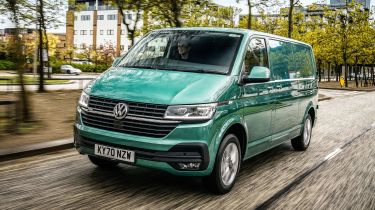Van finance explained
Van finance is largely similar to buying a car on finance, but there are more perks involved when buying a work vehicle

When buying a van on finance to support your business, you’ll want to make sure it’s big enough, economical enough to keep expenses down and reliable enough for you to depend on when you need it. When it comes to how you’ll pay for it, it’s no longer simply a case of handing over the cash with so many tempting finance deals available these days.
The simplicity of paying for a van outright can also be tempting and the wide array of finance options can be daunting for some, but taking the time to look into what’s on offer makes a lot of sense and can remove some of the hassle of van ownership in the long run.
Many finance options can come without any deposit contributions at 0% APR, meaning you don’t need to save too long to get in the driver’s seat. Leasing is also an option which allows you to spread your costs even further. With so many finance options available, it might be easier to find something that suits your budget and needs than you’d expect.
It does require a bit of thought to know which kind of finance would best benefit you and your business, so we’ve broken down the different options and weighed up the pros and cons of each to help you make the right decision.

Personal loan
- Pros: You can choose from a wider variety of lenders
- Cons: A simple loan with no perks, if you don’t keep up the repayments your van may be at risk
For some, the benefit of a personal loan is that it’s fairly simple. You’ll pay a deposit, then agree on monthly repayments over a period of time until you become the full owner of the van. The benefit to these loans is that you can either agree a finance rate with a van dealer or go straight to the bank or another lender to organise your own loan.
When you organise a bank loan, you’re simply adding interest to the cash payment you would have originally made as a lump sum, but the benefit is that the monthly repayments make the cost more manageable. Banks often offer preferential rates for businesses as well as some flexibility with delayed repayments that can help firms with their finances. With this basic type of arrangement, you will become the owner of the van once you come to the end of the agreement, but your van could be repossessed if you don’t keep up with repayments and you will lose the money you put into it.
Contract hire
- Pros: You can get a new van every year or so and payments are consistent
- Cons: Initial payments can be costly and you won’t own the van
There are a lot of advantages to contract-hire agreements, because they’re designed to offer you access to a better van at a lower cost. The payment system is similar to a regular loan, although it’s important to remember you won’t own the van at the end of it.
There are some benefits to not owning the van outright, though. A lot of contract-hire deals include maintenance in the price, and if they don’t, it shouldn’t cost too much extra per month. There’s usually a flexible length to the agreement and a mileage cap which you can negotiate, which is good for the presentation of your business when you change your van to a more modern one every few years or so.
Discounted signwriting rates are offered by some companies, should you want to advertise your business on the van, and leasing deals usually have 24-hour breakdown assistance included in the price.
The disadvantage to contract hire is that it’s more like a rental contract than truly owning the van. Once you come to the end of your agreement you won’t own the van, but you might prefer this arrangement if you’re not bothered about outright ownership.
Lease purchase
- Pros: Flexible mileage terms and low costs
- Cons: High-cost payments at the start and end of agreement, and have to stick with the same manufacturer
The biggest difference between lease purchase agreements and contract hire is that lease purchase allows you the option of buying the van at the end of the agreement. There is a large initial deposit usually followed by reasonable monthly payments. You then pay another large sum at the end of the contract if you want to keep the van outright.
To reduce the price you can often trade in your existing van to bring down the cost of the initial payment which makes things a little more financially manageable.
Cash
- Pros: Straight-forward outright ownership, no complicated finance agreements to follow
- Cons: More to bear in mind when declaring tax and you’re solely responsible for the upkeep of the van
If you would still prefer to pay in cash, in some ways this is the most basic way of buying a new van, but it’s not necessarily the smartest option. Once you pay for the van, it’s yours to do whatever you want with it, and this comes with its share of advantages and disadvantages depending on how you look at it.
You are entirely responsible for the upkeep and maintenance of your van, so if you cover a lot of miles in it, it could cost you. As your van gets older, there’s bound to be a lot of wear and if you don’t keep it in the best condition it could reflect badly on the image of your business and put off potential clients.
It’s also worth bearing in mind that you’ll need to get a receipt for the transaction when you buy a van outright for VAT reasons – you won’t want to cause problems with the taxman and cause issues for your business.
Annual Investment Allowance
If you run a small business, you should consider your Annual Investment Allowance (AIA) if you buy a new van. You are required to pay tax to HM Revenue and Customs on any profits you make in a tax year, but you can subtract the value of any investments made in that year before the government takes its cut.
Although the AIA limit was previously set at £200,000, a temporary limit increase of up to £1 million came into effect between 1 January 2019 and 31 December 2021, although it is not yet clear whether this has been extended into 2022. While vans are eligible to claim as a business investment, cars are not.
You might be tempted to buy a van outright for this reason, to offset the cost against your AIA, but it’s worth noting that the monthly van lease payments can also be claimed across a few years of AIA anyway. This means you could put more of your annual allowance towards other tools and equipment eligible for AIA if you need to.
Not all finance plans qualify for AIA, so speak to your accountant to clarify which ones do to ensure you are able to offset the cost of your van appropriately.
If you can’t decide on which van to go for, check out our guide to best large vans
Car finance made simple
- New car finance explained
- Used car finance: top tips
- PCP car finance explained
- HP car finance explained
- PCH car finance explained
- PCP vs HP: car finance options
- PCP car finance on used cars
- Car finance negative equity explained
- How to refinance a car
- Getting car finance with bad credit
- What are guarantor loans?
- What is an HPI check?
- What is GAP insurance?
- Van finance explained
- Car finance made simple
Most Popular
Tips & advice

Car dashboard warning lights: what does each symbol mean?

Electric car charging stations: public networks, charger types, apps and maps







